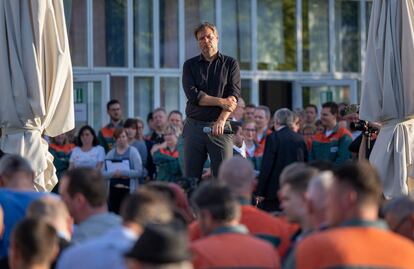From the mayor's office, the chimneys of the refinery can be clearly seen.
Schwedt, a German town of 34,000 inhabitants a few kilometers from the Polish border, is home to this gigantic facility built during the Cold War that occupies more square meters than the city itself.
When asked about its importance, Annekathrin Hoppe, 60, points to a spot to the right: “See that flame?
It's the safety torch.
It is always burning to avoid any pressure change.
People here usually look up to look at her.
It gives them security to see it lit.”
More information
The war in Ukraine, live
In Schwedt the consequences of the Russian invasion of the Ukraine can almost be felt.
As in the rest of Germany, the shopping cart has become more expensive and refueling is more expensive, but here the future of an entire city is at stake.
The refinery, with 1,200 direct jobs and another 2,200 in associated industrial and service companies, is the largest employer, “the economic heart of the city”, as Hoppe defines it.
And its viability is in danger.
The plant processes Russian oil that arrives directly through one of the world's largest pipelines, the Druzhba (friendship in Russian).
Prohibiting their importation, as defended by Berlin and discussed by the Twenty-seven in Brussels for a few weeks, could have catastrophic consequences in Schwedt and in the entire Uckermark region.
The mayor of Schwedt, Annekathrin Hoppe, in her office last Friday. Elena Sevillano
Germany surprised the rest of Europe when, a few weeks ago, it went from being one of the most reluctant capitals to energy sanctions to being at the forefront of those who want to ban the import of Russian oil.
The Minister of Economy and Climate, the green Robert Habeck, put into figures the race against the clock to reduce German dependence: if before the war Russian crude oil accounted for 35% of imports, the country had managed to reduce it to 12 %.
The economy, he said, would no longer sink.
The obstacle to go down to 0% is precisely Schwedt.
The refinery, called PCK, is majority owned by Rosneft, the Russian state oil company.
Controlled by the Kremlin, for now it is not willing to process oil other than Russian.
Unless they force you.
The Government is considering taking control of the installation, as it has already done with the German subsidiary of Gazprom, the public gas company.
And no one rules out that he will nationalize it.
The Bundestag last week approved a law that allows the state to appropriate the assets of companies critical to the supply of energy.
Economy and Climate Minister Robert Habeck talks to employees at the Schwedt refinery.
MONIKA SKOLIMOWSKA (AFP)
Habeck visited the plant last week.
With his black shirt rolled up, he improvised a lectern by climbing on a table and promised the employees that he would do everything possible to guarantee the survival of the company and keep their jobs.
They fired him "with skepticism," says the mayor.
The gasoline and diesel that drive nine out of 10 cars in eastern Germany come from Schwedt.
Planes at Berlin airport use their kerosene;
many heating, its diesel.
The government believes it could replace 60% of the crude in the Druzhba pipeline with oil shipped to the ports of Rostock, in Germany, and Gdansk, in Poland.
But that, in addition to being very expensive, would mean a reduction in production, an increase in prices and shortages.
“I'm not saying that cutting ties with [Vladimir] Putin is not the right thing to do, but it would be a disaster for this city,” says Kerstin Otto as she carefully arranges the white asparagus she sells at her vegetable stall.
A little further on, in front of a shopping center with Soviet aesthetics, Ariane Rettschlag finishes a cigarette before returning to her hairdresser.
“If jobs are lost at the refinery it will affect us all;
not just the employees there.
More people will leave the city and commerce will suffer.
I will lose clients”, she laments.
At the entrance to the shopping center, Silvia Granzow-Schumacher complains about her meager pension, about the prices of basic products —inflation, at 7.4%, has registered its record since reunification—, and acknowledges that she is against the embargo on Russian oil: “I feel bad for the Ukrainians,
Shopping center in the center of Schwedt. Elena Sevillano
In the 1950s, Schwedt had just over 6,000 inhabitants, but the opening of the refinery and a paper mill in the 1960s and the county hospital in the 1970s attracted thousands of people.
It was then that the
Plattenbauten
, prefabricated panel buildings typical of East Germany, were built, which today manicuredly line both sides of the city streets.
By 1989 Schwedt already exceeded 50,000 inhabitants.
Joachim is one of the PCK employees that the minister did not convince, although he says that he is grateful to him for showing his face.
“If I lose my job, we'll probably have to leave Schwedt,” he says with a shrug.
Jobs at the refinery are highly specialized.
The mayor, born in the city and who until a few days ago did not have a party card — she has just joined the SPD — explains that it is impossible for other companies to quickly absorb that workforce.
Hoppe says he is aware that the refinery's days were still numbered.
In a few years, the energy transition would have forced it to be reconverted.
Now those years are months, or weeks, and Hoppe regrets not having time: "I hope there is a temporary solution and oil can be brought in from somewhere else."
Follow all the international information on
and
, or in
our weekly newsletter
.
Exclusive content for subscribers
read without limits
subscribe
I'm already a subscriber














